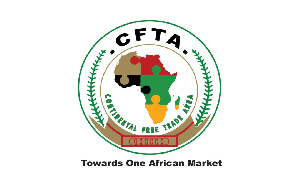 African Continental Free Trade Area
African Continental Free Trade Area
Ghanaian industrialists and exporters have a ready market within West Africa but they would need to look beyond this comfort zone as continental trade picks steam.
It’s no doubt that the success or otherwise of Ghana production sector and private sector, as a whole, in the AfCFTA market hinges on their competitiveness, in terms of quality, cost of capital and power as well as a trade facilitating environment.
The business community, governmental agencies and other industry-specific stakeholders have a critical role to play in this regard.
But much of the work hangs on traders and producers who may want to push their goods onto the continental market.
It is not therefore surprising that the Association of Ghana Industries (AGI) has aptly tasked its members to adopt and implement the right systems that could drive their participation and trade beyond the West African market—which they already have a strong hold of.
Standardisation is another area that producers would have to pay attention as it will be a key criterion for market acceptance of their goods.
Fortunately, there are a good number of local manufacturers that are producing goods that meet ISO certifications, which is good for our cross-border trade especially those goods will compete with similar or like products from some of Africa’s production superpowers.
“When you’re promoting exports, you don’t bring every producer and try to push all of them to a stock; you look for those with the enthusiasm and capacity to produce goods that meet the standard of the destination markets,” the association’s chief executive, Seth Twum Akwaboah, suggests.
We side with this recommendation of the AGI on the need for a structured and targeted approach to promoting exports under the AfCFTA which will ensure that both the nation and direct local actors in the AfCFTA could fully optimize the market.